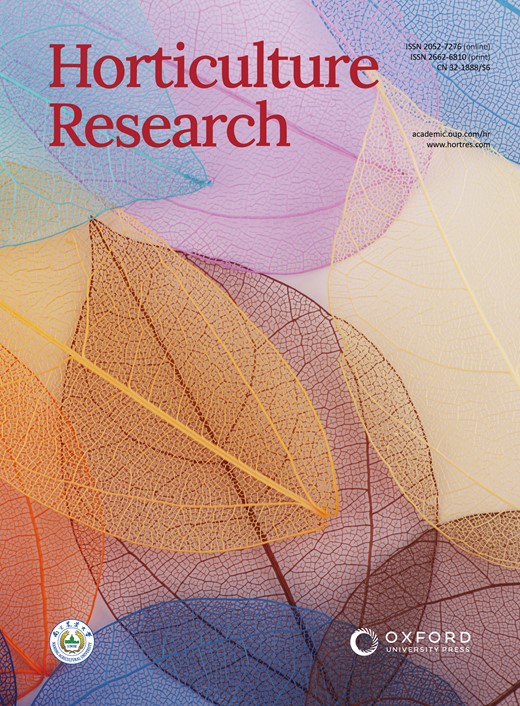SlALKBH9B通过调节乙烯的产生参与干旱诱导的花落
IF 8.5
1区 农林科学
Q1 Agricultural and Biological Sciences
引用次数: 0
摘要
干旱导致番茄(Solanum lycopersicum)的花果脱落,给农业造成严重的产量和经济损失。然而,其作用机制尚不清楚。n6 -甲基腺苷(m6A)甲基化是一种普遍的表观遗传变化,与植物的生长、发育和适应非生物胁迫因素有关。然而,它是否参与了干旱诱导的脱落还有待进一步研究。本文报道了番茄去甲基化酶α -酮戊二酸依赖双加氧酶B (AlkB)同源物9B (SlALKBH9B)通过介导乙烯产生对干旱诱导的落花产生不利影响。我们发现干旱显著降低了SlALKBH9B的表达,敲除SlALKBH9B促进了花落,而过表达SlALKBH9B延缓了花落。在干旱条件下,Slalkbh9b的乙烯产量明显高于野生型(WT),而Slalkbh9b过表达植株的乙烯产量较低。乙烯可以消除SlALKBH9B过表达的延迟脱落效应。进一步的研究表明,干旱下调了SlALKBH9B的表达,特异性地提高了番茄乙烯过量产生者1 (SlETO1)的3 '非翻译区(UTR)的甲基化水平,导致SlETO1 mRNA的稳定性和蛋白质翻译效率下降。SlETO1缺失导致番茄1-氨基环丙烷-1-羧酸合成酶3 (SlACS3)和SlACS8在脱落区积累,从而促进乙烯的产生,加速脱落。结果表明,SlALKBH9B是干旱诱导脱落的重要抑制剂,揭示了干旱增强乙烯产生导致花落的新机制。本文章由计算机程序翻译,如有差异,请以英文原文为准。
SlALKBH9B is involved in drought-induced flower drop by regulating ethylene production
Drought induces tomato (Solanum lycopersicum) flowers and fruits drop, which causes serious yield and economic losses in agriculture. However, the mechanism of action remains unclear. N6-methyladenosine (m6A) methylation is a prevalent epigenetic change integral to the growth, development, and adaptation of plants to abiotic stress factors. However, whether it participates in drought-induced abscission remains to be further studied. Here, we report that tomato demethylase alpha-ketoglutarate-dependent dioxygenase B (AlkB) homolog 9B (SlALKBH9B) exerts a detrimental influence on the regulation of drought-induced flower drop by mediating ethylene production. We found that drought markedly reduced the expression of SlALKBH9B, and knockout of SlALKBH9B enhanced flower drop, while overexpression of SlALKBH9B delayed the flower drop. Under drought conditions, the ethylene production of Slalkbh9b exhibited a considerably greater yield than that of the wild type (WT), while SlALKBH9B overexpression plants had lower ethylene production. Application of ethylene could abolish the delayed abscission effect of overexpression of SlALKBH9B. Further studies showed that drought downregulated SlALKBH9B expression, which specifically enhanced the methylation level of the 3′ untranslated region (UTR) of tomato ethylene excess producer 1 (SlETO1), leading to a decrease in the stability of SlETO1 mRNA and its protein translation efficiency. The loss of SlETO1 resulted in the accumulation of tomato 1-aminocyclopropane-1-carboxylic acid synthase 3 (SlACS3) and SlACS8 in the abscission zone (AZ) and then boosted ethylene production to accelerate abscission. Our results show that SlALKBH9B is an important inhibitor for drought-induced abscission and reveal a new mechanism through which drought-enhanced ethylene production leads to flower drop.
求助全文
通过发布文献求助,成功后即可免费获取论文全文。
去求助
来源期刊

Horticulture Research
Biochemistry, Genetics and Molecular Biology-Biochemistry
CiteScore
11.20
自引率
6.90%
发文量
367
审稿时长
20 weeks
期刊介绍:
Horticulture Research, an open access journal affiliated with Nanjing Agricultural University, has achieved the prestigious ranking of number one in the Horticulture category of the Journal Citation Reports ™ from Clarivate, 2022. As a leading publication in the field, the journal is dedicated to disseminating original research articles, comprehensive reviews, insightful perspectives, thought-provoking comments, and valuable correspondence articles and letters to the editor. Its scope encompasses all vital aspects of horticultural plants and disciplines, such as biotechnology, breeding, cellular and molecular biology, evolution, genetics, inter-species interactions, physiology, and the origination and domestication of crops.
 求助内容:
求助内容: 应助结果提醒方式:
应助结果提醒方式:


